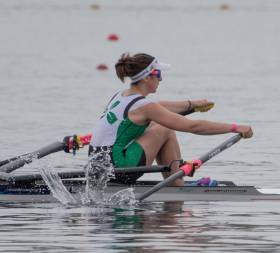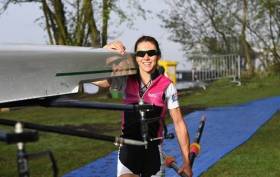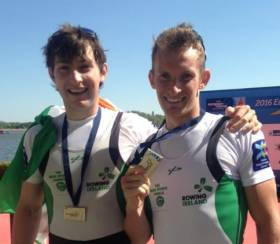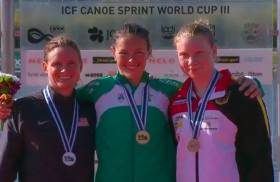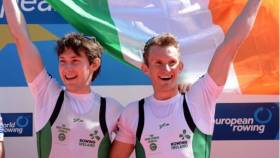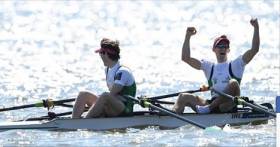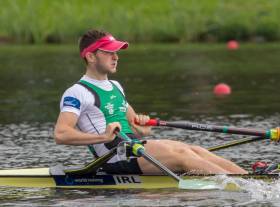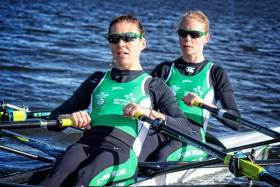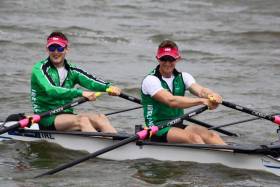Displaying items by tag: World Cup
Walsh Third in Rain and Wind in Poznan
#Rowing: Denise Walsh had to settle for third and a place in the repechage of the lightweight single sculls at the World Cup regatta in Poznan, Poland. In deteriorating conditions with a building wind and squalls, Aja Runge Holmegaard of the Netherlands won. Walsh was in with a chance of taking the second qualifying place, but was pushed out of it in the third quarter by Amber Van Zomeren of the Nethlerlands.
World Cup Regatta, Poznan, Poland (Irish interest; selected results)
Men
Lightweight Double Sculls - Heats (Winner to A Final; rest to Repechages) - Heat One: 1 France 6:19.48; 3 Britain (W Fletcher, R Chambers) 6:25.13.
Heat Two: 1 Norway 6:18.90; 2 Ireland (G O'Donovan, P O'Donovan) 6:19.45, 3 Austria 6:34.23.
Women
Lightweight Double Sculls - Heats (Winner to A Final; rest to Repechages) - Heat One: 1 Netherlands 7:04.01.
Heat Two: 1 Ireland (C Lambe, S Lynch) 7:05.36; 2 Poland 7:06.48, 3 Netherlands Two 7:09.28.
Lightweight Single Sculls - Heat Two (First Two to A/B Semi-Finals; rest to Repechages): 1 Denmark (A Runge Holmegaard) 7:55.99, 2 Netherlands Three (A Van Zomeren) 7:56.83; 3 Ireland (D Walsh) 8:11.09.
Great Win for Lynch and Lambe Takes Them to A Final
# Rowing: On a day which started with a storm, Ireland's Sinead Lynch and Claire Lambe booked themselves a place in the A Final with a calm finish in the World Cup Regatta in Poznan this morning. New Zealand led at half way, but Sophie McKenzie caught a crab and the boat stopped. Ireland, Poland and the Netherlands Two fought it out to take the one A Final place, with Lambe and Lynch holding off a push by the Poles coming up to the line.
World Cup Regatta, Poznan, Poland (Irish interest; selected results)
Women
Lightweight Double Sculls - Heats (Winner to A Final; rest to Repechages) - Heat One: 1 Netherlands 7:04.01.
Heat Two: 1 Ireland (C Lambe, S Lynch) 7:05.36; 2 Poland 7:06.48, 3 Netherlands Two 7:09.28.
Storms Cause World Cup Rowing Suspension
#Rowing: Storms with thunder, lightning and torrential rain forced the suspension of racing at the final World Cup in Poznan, Poland this morning. The organisers are set to announce a new porgramme with racing starting again before midday and the 3pm and 5pm sessions pushed forward two hours.
Ireland have four crews competing - the lightweight men's and women's doubles, the lightweight men's pair and lightweight single sculler Denise Walsh. Sanita Puspure, who had a head cold, did not travel.
Gold for Jenny Egan at World Cup
#Canoeing: Jenny Egan won a gold medal at the canoe sprint World Cup in Montemor-o-Velho in Portugal today. In a sprint to the line in strong winds Egan had .99 of a second to spare over Margaret Hogan of the United States. Melanie Gebhardt of Germany took the bronze. Egan also reached the A Final of the K1 500 metres.
The Salmon Leap paddler took silver in the last World Cup in Racice in the Czech Republic.
#Rowers of the Month: Paul O’Donovan and Gary O’Donovan have had a remarkable few weeks, and are the Afloat Rowers of the Month for May. The brothers from Cork came into the month having taken silver at the first World Cup in Italy and they won gold in the lightweight double sculls at the European Championships in Brandenburg in Germany - the first Ireland rowing crew to become European Champions.
They faced a tough test to reach the final of the second World Cup in Lucerne, but got there through a semi-final won by Britain’s Will Fletcher and Richard Chambers, the world silver medallists from 2015. In the final, the Ireland crew finished fourth. They put Britain behind them and finished just behind the three world champions from the last three years: France (2015 champions), Norway (2013) and South Africa (2014).
Rower of the Month awards: The judging panel is made up of Liam Gorman, rowing correspondent of The Irish Times, and David O'Brien, editor of Afloat magazine. Monthly awards for achievements during the year will appear on afloat.ie and the overall national award will be presented to the person or crew who, in the judges' opinion, achieved the most notable results in, or made the most significant contribution to rowing during 2016. Keep a monthly eye on progress and watch our 2016 champions list grow.
Irish Denied Bronze at Finish in World Cup Final
#Rowing: Ireland’s Paul and Gary O’Donovan finished fourth in the A Final of the lightweight double sculls at the World Cup in Lucerne this morning. France's new crew of Pierre Houin and Jeremie Azou were impressive winners, with Norway holding off charges by South Africa and Ireland in the final 250 metres to take silver. The young Ireland crew pushed hard but South Africa took the bronze by just over a second. Britain’s Will Fletcher and Richard Chambers were a length behind Ireland in fifth.
World Cup Regatta, Lucerne, Switzerland (Irish interest; selected results)
Men
Lightweight Pair – A Final: 1 Britain (J Cassells, S Scrimgeour) 6:31.03.
Lightweight Double Sculls – A Final: 1 France (P Houin, J Azou) 6:19.26, 2 Norway 6:21.81, 3 South Africa 6:22.42; 4 Ireland (G O’Donovan, P O’Donovan) 6:23.46, 5 Britain (W Fletcher, R Chambers) 6:25.72, 6 United States 6:28.08.
Women
Lightweight Double Sculls – B Final (Places 7 to 12): 1 Ireland (C Lambe, S Lynch) 7:01.36, 2 Poland 7:03.01, 3 Britain 7:04.88.
Driven Irish Win B Final in Lucerne
#Rowing: Ireland’s lightweight women’s double won the B Final emphatically at the World Cup Regatta in Lucerne this morning, placing seventh at this prestigious regatta. The crew of Sinéad Lynch (née Jennings) and Claire Lambe had come very close to taking an A Final place. They dominated this B Final. The race was quite close early on, but Ireland took control before half way and carved out a clear water lead. Poland were second and Britain third.
World Cup Regatta, Lucerne, Switzerland (Irish interest; selected results)
Men
Lightweight Pair – A Final: 1 Britain (J Cassells, S Scrimgeour) 6:31.03.
Women
Lightweight Double Sculls – B Final (Places 7 to 12): 1 Ireland (C Lambe, S Lynch) 7:01.36, 2 Poland 7:03.01, 3 Britain 7:04.88.
Paul and Gary O'Donovan Take Place in A Final in Lucerne
#Rowing: Ireland’s Paul and Gary O’Donovan took third place in their semi-final of the lightweight double sculls and secured a spot in the A Final at the World Cup Regattta in Lucerne. Britain’s Will Fletcher and Richard Chambers (a Coleraine man) had a disappointing heat but made up for it here: they started well and led until headed by Norway. Behind both, Ireland held off Poland to take the last qualification place. France were the fastest crew of the day in winning the first semi-final, with South Africa and the United States also going through.
World Cup Regatta, Lucerne, Switzerland (Irish interest, selected results)
Men
Lightweight Double Sculls – Semi-Finals (Three to A Final; rest to B Final) – Semi-Final One: 1 France (P Houin, J Azou) 6:19.16, 2 South Africa 6:21.91, 3 United States 6:22.15.
Semi-Final Two: 1 Norway (K Brun, A Strandli) 6:19.63, 2 Britain (W Fletcher, R Chambers) 6:21.37, 3 Ireland (G O’Donovan, P O’Donovan) 6:23.30; 4 Poland 6:24.08, 5 Switzerland 6:33.62, 6 Chile 6:40.20.
Women
Lightweight Double Sculls – Semi-Finals (Three to A Final; rest to B Final) – Semi-Final One: 1 New Zealand 7:01.10, 2 South Africa 7:01.16, China One 7:03.37.
Semi-Final Two: 1 Canada (L Jennerich, P Obee) 6:58.88, 2 Denmark 7:00.91, 3 2 China Two 7:01.80; 4 Ireland (C Lambe, S Lynch) 7:02.23.
Lynch and Lambe Denied A Final Place by Half a Second
#Rowing: Ireland’s Sinead Lynch and Claire Lambe just missed out on an A Final place at the World Cup Regatta in Lucerne today. The lightweight double semi-final was a good race – only Canada looked certain of a top three spot going into the final sprint and they won. Denmark finished well and took second, with China Two just taking the crucial third spot ahead of Ireland. The margin was just .43 of a second.
World Cup Regatta, Lucerne, Switzerland (Irish interest, selected results)
Women
Lightweight Double Sculls – Semi-Finals (Three to A Final; rest to B Final) – Semi-Final One: 1 New Zealand 7:01.10, 2 South Africa 7:01.16, China One 7:03.37.
Semi-Final Two: 1 Canada (L Jennerich, P Obee) 6:58.88, 2 Denmark 7:00.91, 3 2 China Two 7:01.80; 4 Ireland (C Lambe, S Lynch) 7:02.23.
O'Donovans Take Place in Lucerne Semi-Final
#Rowing: Ireland qualified directly for their second semi-final of the morning at the World Cup in Lucerne as Paul and Gary O’Donovan took second in their heat of the lightweight double sculls. South Africa, the crew with the world’s best time, led all the way and won. Ireland took over in second by half way and finished under a second behind the South Africans. They held off a push by Switzerland in the final quarter. The Swiss also qualified.
World Cup Regatta, Lucerne, Switzerland (Irish interest, selected results)
Men
Lightweight Double Sculls – Heats (Three to A/B Semi-finals; rest to Repechage) – Heat One: 1 South Africa 6:21.98, 2 Ireland (G O’Donovan, P O’Donovan) 6:22.89, 3 Switzerland One 6:31.36; 4 Japan One 6:38.28, 5 Angola 6:55.06. Heat Two: 1 France One 6:20.94, 2 Poland One 6:25.55, 3 Brazil 6:35.48. Heat Three: 1 Norway 6:21.26, 2 United States 6:23.33, 3 Britain 6:37.22.
Women
Lightweight Double Sculls – Heats (Two to A/B Semi-Finals; rest to Repechage) – Heat One: 1 South Africa 6:57.90, 2 China Two 7:01.11. Heat Two: 1 Canada 6:56.56, 2 China One 6:57.98.
Heat Three: 1 New Zealand 7:00.16, 2 Ireland (C Lambe, S Jennings) 7:01.90; 3 Germany One 7:05.79, 4 Russia One 7:06.01, 5 Chile One.


























